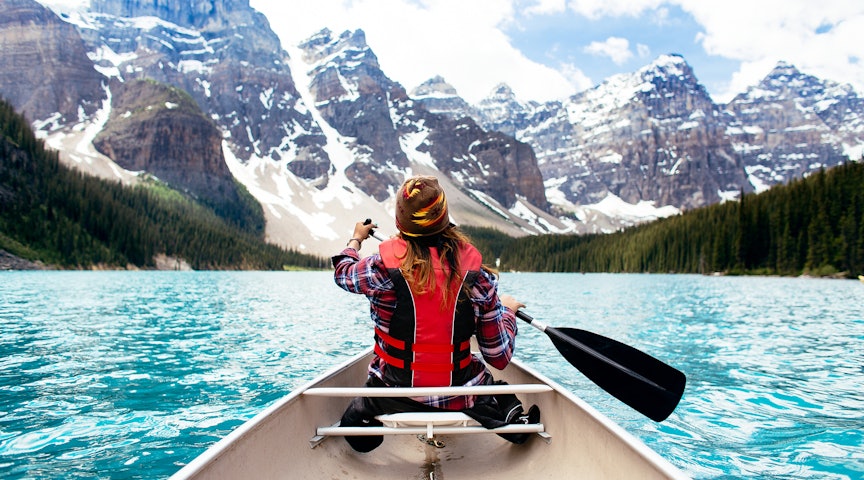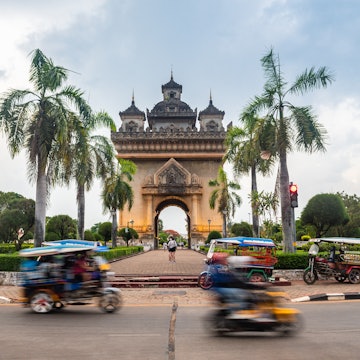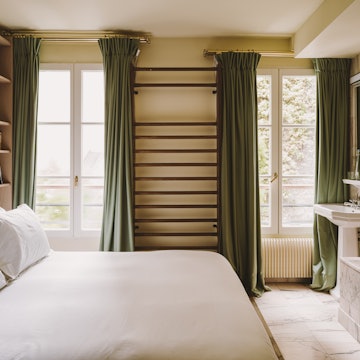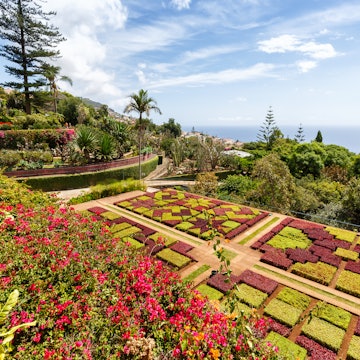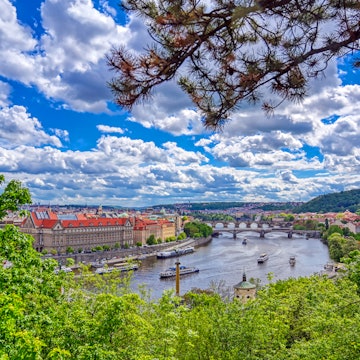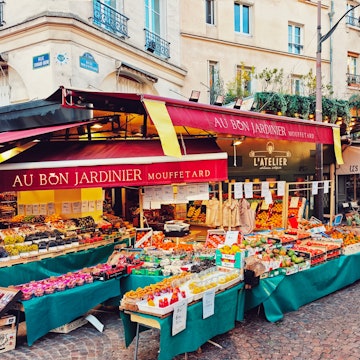

A transparent castle made of giant ice blocks is lit with a blue light from inside, against a pitch black sky.
In Québec City, the capital of French Canada, winters are ridiculously long (it can snow anytime from October to May) and residents have learned to make the most of the bone-numbing cold.
The result? Carnaval de Québec, an exuberant 17-day fête of winter’s deep freeze in January or February, billed as the world’s largest winter celebration. Here's how to make the most of this frigid festival.

Carnaval’s proud heritage
The history of Carnaval in Québec City dates back to the 1890s but today’s annual event was born in the mid-1950s, when Pierrette Roy’s jaunty theme song “Carnaval, Mardi Gras, Carnaval” first hit the airwaves and Carnaval’s smiling mascot made his official debut. Ever since, the festival has become a mainstay of Québec’s civic identity, with parades, winter sports competitions, an entire ‘village’ devoted to kids’ events, and the contagious energy of thousands of revelers braving the elements to embrace the city’s frosty beauty.
At the heart of it all lies an irrepressible sense of regional pride. Reminders of Québec’s unique heritage are everywhere, from the fleur-de-lis flags flying over the provincial parliament to the fur hats adorned with past years’ Carnaval pins worn by local festival-goers.
Presiding over the festivities is that adorable mascot, Bonhomme Carnaval – an irresistibly cheerful giant snowman sporting the bright red tuque (hat) and colorful ceinture fléchée (woven sash) of the early French-Canadians. Vaguely resembling a Québécois incarnation of the Michelin man, Bonhomme circulates through the festival, greeting everyone from kids to dignitaries with hugs, waves of his puffy white hand and incongruously acrobatic leg kicks. Even if you somehow miss the live Bonhomme, you’ll see his image everywhere – plastered on shop windows, in larger-than-life statues scattered about town, and smiling out from the effigies (entrance badges) that hang on the zipper of every Carnaval-goer’s jacket.
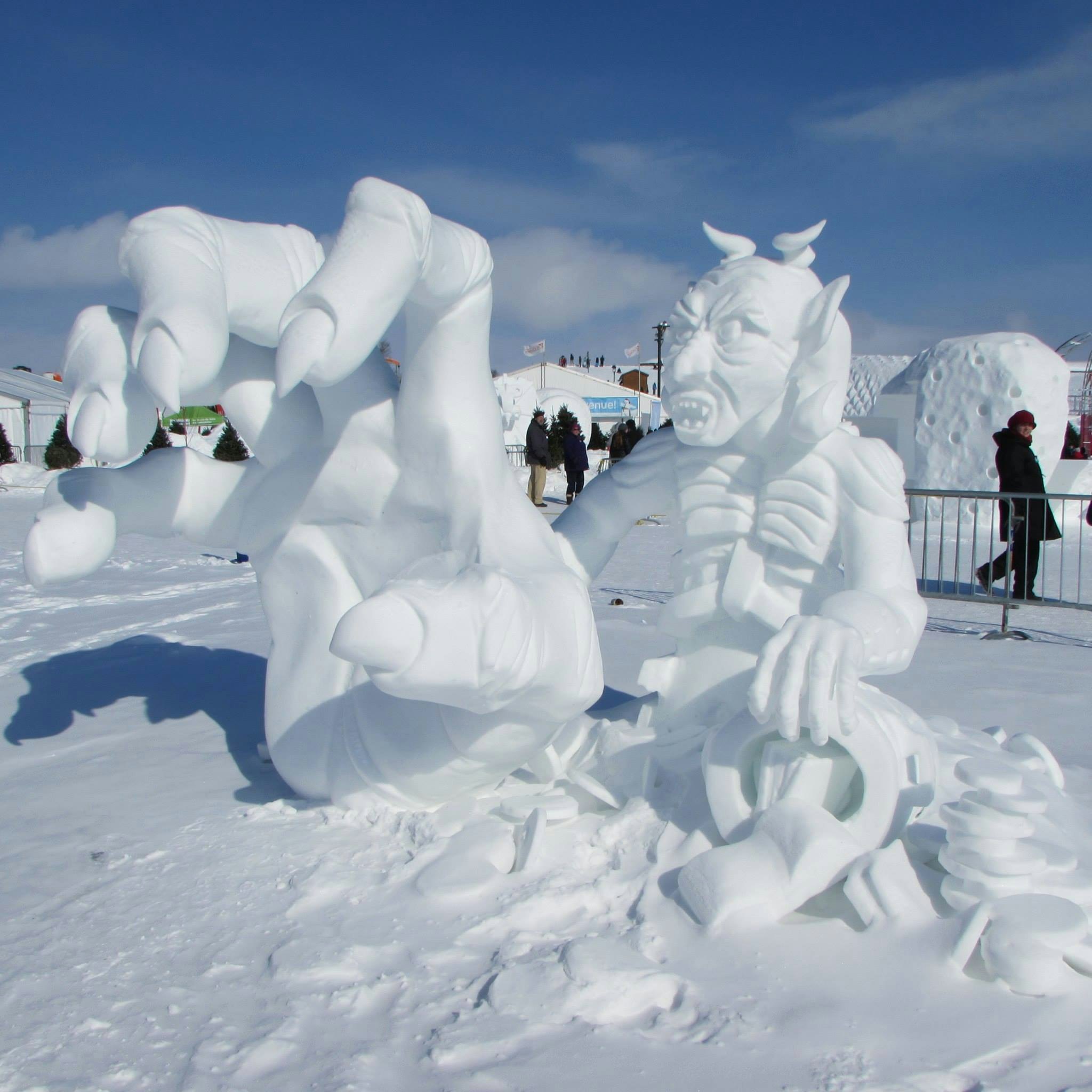
Setting the stage
In the build-up to Carnaval, decorations like benches, statues and slides sculpted from ice, Adirondack chairs set around blazing fire pits, and colorful strands of light tracing the contours of trees create magical visual effects throughout the walled city. Artists begin chiseling away at masses of ice for the international ice sculpture competition, cabanes à sucre (maple sugar shacks) spring up on street corners, and city squares get prepped for special events, from axe-throwing to mechanical moose rides to traditional Québécois music and dance.
Meanwhile, brick by frozen brick, a gigantic ice palace is built for Bonhomme just outside the Old Town walls. In Carnaval’s early years, teams would cut giant blocks from the frozen St Lawrence River and haul them up the hill to create Bonhomme’s icy lair. These days the process is more mechanized, but the result is still pure magic. The finished palace towers over a dozen meters tall, in designs that change from year to year, its glazed contours hypnotically floodlit at night in electric blues, purples, oranges and pinks.

Let the show begin
Opening ceremonies take place on a Friday evening, when seven duchesses representing Québec City’s seven boroughs arrive by calèche (horse-drawn carriage) at Bonhomme’s ice palace, escorted by red-clad soldiers in tall black hats from Québec’s royal 22nd regiment. Bundled in furs, the duchesses smile and shiver, cavorting with Bonhomme and greeting the enthusiastic crowd. Eventually, Bonhomme crowns one as queen, cuts a giant ribbon, and the revelry begins.
For the next 17 days, a non-stop calendar of Carnaval events ensues. Whatever you do, don’t miss the bain de neige, a smile-inducing spectacle in which dozens of demented volunteers don swim suits and dance with Bonhomme in the freezing cold, pummeling each other with snowballs and trying to stave off frostbite before hustling back to their heated dressing room. Equally exciting are the ice canoe races through the daunting floes of the frozen St Lawrence River and a pair of night parades, where whimsical floats representing Nordic themes from wolves to narwhals circle the Upper Town’s streets. Other events vary from year to year, with everything from dogsled competitions and horse-drawn sleigh races to Carnaval-themed big-screen video games designed for a younger clientele.
For pure exhilaration, nothing beats the spine-tingling glissade (ice slide) on the Terrasse Dufferin, an expansive boardwalk overlooking the St Lawrence River. A three-dollar ticket lets you haul your toboggan to the top of the 100m-long slide and hurtle back down at speeds approaching 70km per hour – with jaw-dropping views of the palatial Château Frontenac hotel unfolding before you.

Carnaval cuisine: beaver tails and caribou
Rounding out the fun, naturally, are food and drink. Québec City is an epicure’s delight any time of year, thanks to many French-influenced bistros and bakeries. And the cold weather only enhances the appeal of hearty fare like cassoulet, bouillabaisse and raclette, while big bowls of café au lait and chocolat chaud work wonders in warding off the icy chill.
For Carnaval, an extra slew of wintry treats hits the streets. Perennial favorites include beaver tails (paddle-shaped wedges of fried dough covered with toppings that range from chocolate-hazelnut to cinnamon-sugar) and tire d’érable, a quintessentially Québecois taffy made from hot maple syrup poured on snow, then rolled onto sticks as it congeals.
Carnaval’s iconic drink is caribou, a heart-warming blend of port and sherry fortified with vodka, brandy, lemon peel and spices. Bars around the fairground sell caribou in plastic cups, but for a more memorable experience ask for a glass made of ice, or buy a canne (a hollow plastic cane festooned with Bonhomme’s visage) and get it filled to the brim – for a Carnaval-inflated price, naturally!

Planning your Québec visit
Ready to brave the chill? Reserve hotel rooms in advance, and stay near Québec City’s parliament building for easiest access to Carnaval events. You’ll need an effigie (entrance badge, $15) to access the main sites. For a full program see carnaval.qc.ca. Oh, and don’t forget your warm clothes!
Take your Canada trip with Lonely Planet Journeys
Time to book that trip to Canada
Lonely Planet Journeys takes you there with fully customizable trips to top destinations – all crafted by our local experts.
